Consider this the return of my List of the Week. On steroids.
As you may recall, roughly a year and a half ago I wrote about my 25 favorite video games -- a rather enormous undertaking, it was. Of course, no less than two days after I posted it, my site's host deleted the entire site because of all the pictures. And when I shifted the rebuilt site over to Topcities, I never did repost the list, largely because I didn't like the way it looked without all the pictures.
But it's been long enough, so it's time to improve the graphics, streamline the features, update the roster, and tighten the controls: the 2K6 version of the Video Games List is here.
For those of you who read it before, a few notes: the 25 choices here are not the same 25 games I listed the first time around, though most of them are -- my tastes haven't changed that radically. What has happened is a lot of reordering: a lot of titles at the top and the bottom of the list have been shifted around to meet my current whims. I didn't do this just to give the list a new polish, but because I honestly reconsidered the numbers. This one fits how I feel today -- tomorrow, I could change my mind and flip them around again.
You can gather a few things from my picks. First off, I am Nintendo's bitch: over half of the games were exclusive to Nintendo systems, and several of the others wound up there eventually. I was also asked why my first list didn't have any real-time strategy games, and it's for the same reason this list doesn't have any -- I've never liked them very much. You will, however, see several RPGs, which have always been my bread and butter. (Though they're almost all
older RPGs -- the newer Star Ocean breed is a little tougher sell with me.)
I hope my choices are interesting. I think there's a unique blend of accepted canon titles and idiosyncratic personal picks -- my #3 choice, especially, will probably raise an eyebrow if you don't already know what it is. But hey, that's why it's a favorites list and not a Best of All Time.
If it weren't for video games, I may have been much dedicated to my work at school. And I might be a rich and famous college graduate by now. So that's my new motto for when I get tired of my life: blame Mario.
Shall we get started?
25. Duck Hunt
 (NES, 1985) That fucking dog. My advice to aspiring game designers: it's the little things that make a game great. Because let's face it -- this game is about as in-depth as Pong. The ducks move in pretty simple "evasive" patterns. And the k-PANG! noise the gun made was annoying as hell. But Duck Hunt really isn't about killing the pixelated ducks. Nor is it about showing off your quick draw with the k-PANG! trigger on the ol' NES Zapper. It's about wiping that smug look off the face of that goddamned dog. See, your trusty hunting dog accompanies you on your trek of duck obliteration. Take a few of them out, he leaps out of the grass with your kill in his paws. Miss...and his rises from hiding with a guffaw and a smirk that will incite anyone to violence. Most people fired more shots at the dog than at the birds. The proof of my point? Duck Hunt also included a clay pigeon firing range, which did not include the dog. Did anybody play this for more than five minutes? Didn't think so.
(NES, 1985) That fucking dog. My advice to aspiring game designers: it's the little things that make a game great. Because let's face it -- this game is about as in-depth as Pong. The ducks move in pretty simple "evasive" patterns. And the k-PANG! noise the gun made was annoying as hell. But Duck Hunt really isn't about killing the pixelated ducks. Nor is it about showing off your quick draw with the k-PANG! trigger on the ol' NES Zapper. It's about wiping that smug look off the face of that goddamned dog. See, your trusty hunting dog accompanies you on your trek of duck obliteration. Take a few of them out, he leaps out of the grass with your kill in his paws. Miss...and his rises from hiding with a guffaw and a smirk that will incite anyone to violence. Most people fired more shots at the dog than at the birds. The proof of my point? Duck Hunt also included a clay pigeon firing range, which did not include the dog. Did anybody play this for more than five minutes? Didn't think so.
24. Blades of Steel
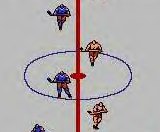 (NES, 1988) It's probably the greatest hockey game ever made. There are no leagues. No stats. The teams are all identical, except for their uniform colors -- and even their uniforms are all designed the same. The teams have no names, mascots, or even logos. The players have neither names nor faces. There is no season mode. No trades, no injuries, no substitutions, no penalties, no nothing. You can imagine how much fun the gameplay would have to be to make up for all that's missing, and it's exactly how good it is. Konami stripped away all that extra stuff -- either because they wanted to or because of the limitations of NES hardware -- and brought nothing but lightning-quick action that never stops being a blast. It's laughably unrealistic: after each goal, the players line up around the scorer and do a synchronized Disney on Ice-like dance; each and every pass is accompanied by the horribly digitized voice of an announcer saying something that sounds like "KISSED THE POLE!" And they knew their audience, too, because not only is fighting allowed, it's encouraged. Get into a scuffle over the puck, and the two players will drop their gloves...and it suddenly turns into a one-on-one fighting game, complete with blocking buttons and health meters. And when it's over, the loser goes to the penalty box. Realism? Who needs it? (And sometimes, between the second and third periods, you'll get to play a Gradius-style minigame. 'Cause the game wasn't already cool enough, I guess.)
(NES, 1988) It's probably the greatest hockey game ever made. There are no leagues. No stats. The teams are all identical, except for their uniform colors -- and even their uniforms are all designed the same. The teams have no names, mascots, or even logos. The players have neither names nor faces. There is no season mode. No trades, no injuries, no substitutions, no penalties, no nothing. You can imagine how much fun the gameplay would have to be to make up for all that's missing, and it's exactly how good it is. Konami stripped away all that extra stuff -- either because they wanted to or because of the limitations of NES hardware -- and brought nothing but lightning-quick action that never stops being a blast. It's laughably unrealistic: after each goal, the players line up around the scorer and do a synchronized Disney on Ice-like dance; each and every pass is accompanied by the horribly digitized voice of an announcer saying something that sounds like "KISSED THE POLE!" And they knew their audience, too, because not only is fighting allowed, it's encouraged. Get into a scuffle over the puck, and the two players will drop their gloves...and it suddenly turns into a one-on-one fighting game, complete with blocking buttons and health meters. And when it's over, the loser goes to the penalty box. Realism? Who needs it? (And sometimes, between the second and third periods, you'll get to play a Gradius-style minigame. 'Cause the game wasn't already cool enough, I guess.)
23. Grand Theft Auto III
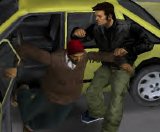 (PS2, 2001) Ah, the good old days, before Hot Coffee, when GTA was simply depraved violence for the whole family. It's hard to explain why this game is so fantastic without sounding like a ghoul, but here goes: killing people is fun! Huh, no, that's no good. Um, how about: I like stealing cars and running over hookers? No, that doesn't work, either. Well, that aside, GTA3 is also an astounding achievement for its sheer size -- Liberty City actually feels like a real city a lot of the time, and it's often more fun to ignore the missions and just drive around listening to the radio. And running over hookers. Okay, I'll admit it, the game does work best as a cathartic release. Who hasn't wanted to drive a tank through downtown, destroying everything in sight? And spray half a city block with a flamethrower? A bad day can so often be soothed through digital homicidal mania. So all you parents who were disturbed by the sex and nudity in GTA: San Andreas, pick up this one. You won't find anything bad here.
(PS2, 2001) Ah, the good old days, before Hot Coffee, when GTA was simply depraved violence for the whole family. It's hard to explain why this game is so fantastic without sounding like a ghoul, but here goes: killing people is fun! Huh, no, that's no good. Um, how about: I like stealing cars and running over hookers? No, that doesn't work, either. Well, that aside, GTA3 is also an astounding achievement for its sheer size -- Liberty City actually feels like a real city a lot of the time, and it's often more fun to ignore the missions and just drive around listening to the radio. And running over hookers. Okay, I'll admit it, the game does work best as a cathartic release. Who hasn't wanted to drive a tank through downtown, destroying everything in sight? And spray half a city block with a flamethrower? A bad day can so often be soothed through digital homicidal mania. So all you parents who were disturbed by the sex and nudity in GTA: San Andreas, pick up this one. You won't find anything bad here.
22. Super Mario Bros.
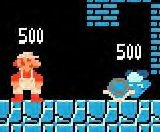 (NES, 1985) The prime offender -- the first game that truly sank its fangs into my brain. Before Mario, games were fun and recreational things to do. After Mario, they became an obsession, and homework be damned. Schoolwork -- especially stupid first-grader schoolwork -- was clearly less important than collecting the shiny glowing golden coins that mysteriously hung in the air...or, even better, hid inside large boxes marked with a question mark. Who would've thought that bouncing off the heads of flying turtles could be so much fun? Throw in the fact that you get a extra life (or an "extra man," as it's colloquially known) with every 100 coins you collect, the gradually increaing difficulty of the later levels, and the most catchy soundtrack in gaming history, and what you've got is crack cocaine in code form.
(NES, 1985) The prime offender -- the first game that truly sank its fangs into my brain. Before Mario, games were fun and recreational things to do. After Mario, they became an obsession, and homework be damned. Schoolwork -- especially stupid first-grader schoolwork -- was clearly less important than collecting the shiny glowing golden coins that mysteriously hung in the air...or, even better, hid inside large boxes marked with a question mark. Who would've thought that bouncing off the heads of flying turtles could be so much fun? Throw in the fact that you get a extra life (or an "extra man," as it's colloquially known) with every 100 coins you collect, the gradually increaing difficulty of the later levels, and the most catchy soundtrack in gaming history, and what you've got is crack cocaine in code form.
Is there anyone out there that didn't love this game back in the mid-eighties? Even my mother, who couldn't stop complaining about the amount of time I spent in front of the Nintendo, got hooked on Mario. There was an informal caste system of the kids in our apartment building: those who could play Mario, and those who could play it well (hey, we were poor and had nothing else to do, except avoid the drug dealers in the building next door -- ah, how I miss Southern California). Mario is one of those before-and-after moments for me, my gateway into the vast addiction of video games.
Oh, and you know this game is all about drugs, right? You eat a magic mushroom, you grow to enormous size? Eat the "magical flower," fire shoots out of your fingertips? This certainly explains the flying turtles.
21. Mike Tyson's Punch-Out!!
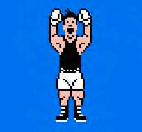 (NES, 1987) Do you like boxing? Interested in seeing a game that perfectly captures every nuance and strategem of the sport, and realistically depicts every blow-to-blow exchange? Then stay far, far away from Mike Tyson's Punch-Out!!, a goofy piece of fun as cartoonish as its namesake. This ain't no simulator. Unlike Blades of Steel, which sacrificed realism to appease to the desires of the audience, Punch-Out kicks reality to the curb in order to turn boxing into pro wrestling. And that's fine, because the game isn't even really about boxing at all, but about quick reflexes and pattern recognition -- your opponents all telegraph their punches and show their weak spots, and your job as Little Mac is to spot them and exploit those weaknesses until you get to the grand champion, Mike Tyson. Assuming you can get to Iron Mike (no cakewalk there), your reward will be to have the shit kicked out of you repeatedly until you either give up in frustration or become a gaming guru and manage to take him out -- a guy who used to babysit for the various kids in that Southern California apartment building became something of a hero because he could actually beat Mike Tyson. I watched him do it, too -- awe-inspiring. For a six-year-old, anyway. Despite the 8-bit NES graphics, there are some neat touches -- between rounds, you see a shot of each fighter's face, with appropriate damage if they've taken a beating. There's also your coach, Doc (who looks oddly like that Twinkie-loving cop from Die Hard), who'll give you advice...though often such advice runs along the lines of "JOIN THE NINTENDO FUN CLUB TODAY, MAC!" Thanks, Doc, that'll help me defeat the angry Japanese man whose fist is as big as my entire torso. Poor Little Mac -- how the hell did he end up in a boxing circuit where every fighter is (literally!) twice his size? I think he should be given a championship belt just for showing up to the damn fight.
(NES, 1987) Do you like boxing? Interested in seeing a game that perfectly captures every nuance and strategem of the sport, and realistically depicts every blow-to-blow exchange? Then stay far, far away from Mike Tyson's Punch-Out!!, a goofy piece of fun as cartoonish as its namesake. This ain't no simulator. Unlike Blades of Steel, which sacrificed realism to appease to the desires of the audience, Punch-Out kicks reality to the curb in order to turn boxing into pro wrestling. And that's fine, because the game isn't even really about boxing at all, but about quick reflexes and pattern recognition -- your opponents all telegraph their punches and show their weak spots, and your job as Little Mac is to spot them and exploit those weaknesses until you get to the grand champion, Mike Tyson. Assuming you can get to Iron Mike (no cakewalk there), your reward will be to have the shit kicked out of you repeatedly until you either give up in frustration or become a gaming guru and manage to take him out -- a guy who used to babysit for the various kids in that Southern California apartment building became something of a hero because he could actually beat Mike Tyson. I watched him do it, too -- awe-inspiring. For a six-year-old, anyway. Despite the 8-bit NES graphics, there are some neat touches -- between rounds, you see a shot of each fighter's face, with appropriate damage if they've taken a beating. There's also your coach, Doc (who looks oddly like that Twinkie-loving cop from Die Hard), who'll give you advice...though often such advice runs along the lines of "JOIN THE NINTENDO FUN CLUB TODAY, MAC!" Thanks, Doc, that'll help me defeat the angry Japanese man whose fist is as big as my entire torso. Poor Little Mac -- how the hell did he end up in a boxing circuit where every fighter is (literally!) twice his size? I think he should be given a championship belt just for showing up to the damn fight.
20. Photopia
 (PC, 1998) When an artform becomes passe and replaced by something more modern, those who stubbornly stick behind with the old ways become more and more esoteric in their designs -- when photography became a more popular alternative to paintings, the artists responded by going abstract. The same thing has happened to interactive fiction -- yes, those all-text adventures like Zork, where you move by typing GO NORTH and hit gnomes with sticks by typing HIT GNOME WITH STICK. When computer graphics were terrible, these games were enormously popular -- it was a lot easier to lose oneself in an interactive book than it was in blocky pixels. Now, though, they're all but forgotten, the dusty relics of a darkened age. So those gamers who cling to their childhood favorites with glee have taken to making their own games, and just like those abstract painters, they're leaving the traditional rules behind.
(PC, 1998) When an artform becomes passe and replaced by something more modern, those who stubbornly stick behind with the old ways become more and more esoteric in their designs -- when photography became a more popular alternative to paintings, the artists responded by going abstract. The same thing has happened to interactive fiction -- yes, those all-text adventures like Zork, where you move by typing GO NORTH and hit gnomes with sticks by typing HIT GNOME WITH STICK. When computer graphics were terrible, these games were enormously popular -- it was a lot easier to lose oneself in an interactive book than it was in blocky pixels. Now, though, they're all but forgotten, the dusty relics of a darkened age. So those gamers who cling to their childhood favorites with glee have taken to making their own games, and just like those abstract painters, they're leaving the traditional rules behind.
I thought long and hard before including Photopia on this list. Not because it isn't brilliant, or because it's not one of the most profoundly original and creative computer games I've ever played -- it's definitely those things. But this is a list of my favorite games, and Photopia is barely a game at all: there are no puzzles to solve, no enemies to defeat, no mysteries to unravel. As the genre name implies, this is truly a piece of interactive fiction, and writer Adam Cadre uses the medium of a text-based game to tell a remarkable story. I won't spoil any of the plot, because doing so would tarnish the experience of playing it. I'll simply say that Cadre manages to attach the player (reader?) to the characters emotionally in a very limited time (the entire game takes no more than half an hour to complete); I myself have played it though at least ten times, often trying desperately to change the story's tragic ending.
But I will say no more. If you'd like to play Photopia (and you definitely should -- no, really, do it right now), you can download it from the interactive fiction section on Adam Cadre's website. You can also find his other games there, like Shrapnel and 9:05, which are almost as wonderful as Photopia. And if you want know what those crazy IF kids are doing these days, and find some of those golden oldies from back in the '80s, check out The Underdogs.
19. You Don't Know Jack!
 (PC, 1995) For an insufferable know-it-all like me, just about any trivia game is fun, but You Don't Know Jack! ups the ante -- it takes away the brainiac air of Trivial Pursuit, replaces it with the smart-aleck attitude of Mystery Science Theater 3000, and sticks in an unseen "host" who operates like Alex Trebek on mescaline. This is a game that's all about multiplayer -- most fun is the Screw Your Neighbor option, where you can force your idiotic opponents to respond to questions they don't have answers for. But if you end up way ahead of them -- as I frequently did -- and try to duck out of answering one, the host will cry, "Don't be a wuss!" and demand an answer. A game that simultaneously celebrates being smart and being a wiseass? That's what I'm talking about.
(PC, 1995) For an insufferable know-it-all like me, just about any trivia game is fun, but You Don't Know Jack! ups the ante -- it takes away the brainiac air of Trivial Pursuit, replaces it with the smart-aleck attitude of Mystery Science Theater 3000, and sticks in an unseen "host" who operates like Alex Trebek on mescaline. This is a game that's all about multiplayer -- most fun is the Screw Your Neighbor option, where you can force your idiotic opponents to respond to questions they don't have answers for. But if you end up way ahead of them -- as I frequently did -- and try to duck out of answering one, the host will cry, "Don't be a wuss!" and demand an answer. A game that simultaneously celebrates being smart and being a wiseass? That's what I'm talking about.
18. Star Wars: Knights of the Old Republic
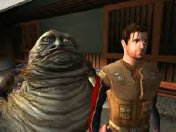 (XBox, 2003) After years of waiting, someone -- in this case, Bioware -- finally made a Star Wars game that was worth a damn. The story they cooked up here is a doozy, too, arguably better than a few of the movies. (I'm looking at Episodes I and II, here.) I also really dug the battle system, an odd mash-up that made turn-based combat look and feel like real-time fighting backed-up by D&D rules. But the best aspect is also its most-hyped: the player's choice between good and evil. Star Wars has always hinged on this simple dichtomy between the light and dark sides of the Force, and to structure a game in this manner, with the player making each choice and sliding toward one side or the other, is a genuis touch. And it effects everything -- dialogue, your appearance, what powers you get. Which leads to another reason why this game one of my favorites: Force lightning. Force lightning rules. All hail Ranis Skenoda, Dark Lord of the Sith!
(XBox, 2003) After years of waiting, someone -- in this case, Bioware -- finally made a Star Wars game that was worth a damn. The story they cooked up here is a doozy, too, arguably better than a few of the movies. (I'm looking at Episodes I and II, here.) I also really dug the battle system, an odd mash-up that made turn-based combat look and feel like real-time fighting backed-up by D&D rules. But the best aspect is also its most-hyped: the player's choice between good and evil. Star Wars has always hinged on this simple dichtomy between the light and dark sides of the Force, and to structure a game in this manner, with the player making each choice and sliding toward one side or the other, is a genuis touch. And it effects everything -- dialogue, your appearance, what powers you get. Which leads to another reason why this game one of my favorites: Force lightning. Force lightning rules. All hail Ranis Skenoda, Dark Lord of the Sith!
17. Fester's Quest
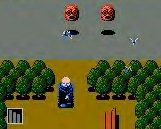 (NES, 1989) The second-craziest game ever made. So aliens invade the world, looking for...well, something, and completely decimate the human race (apparently, since the streets are empty). The only one who can stop them? Uncle Fester. Yes, Fester Addams. From The Addams Family. Stop laughing -- this is the most insanely difficult video game I've ever played. To this day, I've never managed to beat the damn thing. After seeing the alien spaceship one night while moonbathing, Fester picks up his trusty gun and proceeds to wipe out the aliens one at a time. Eventually you pick up a whip, too, which is useful against the bosses. In addition to power-ups that increase your weapons, though, there are also "power-downs," which weaken them and cause you to swear and hurl things at the television. Since Fester is not a fighter by nature, he can't stand up to too many attacks by the aliens (who often look like pink frogs, or floating disembodied heads that eject mosquitos -- did I mention this game was weird?), and will eventually be defeated...and when that happens, it's all the way back to the very frickin' beginning of the game with you. And no save feature, either (at least on the actual NES cartridge -- if you're playing with an emulator, you can save whenever you want to...weakling). The gameplay is pretty simplistic, really -- just walk around and shoot everything that moves, literally -- but the wacked-out difficulty is what makes it memorable. For me, Fester's Quest is like those stairs in Rocky, and if I ever manage to conquer this game, you can bet I'll jump around like that, too.
(NES, 1989) The second-craziest game ever made. So aliens invade the world, looking for...well, something, and completely decimate the human race (apparently, since the streets are empty). The only one who can stop them? Uncle Fester. Yes, Fester Addams. From The Addams Family. Stop laughing -- this is the most insanely difficult video game I've ever played. To this day, I've never managed to beat the damn thing. After seeing the alien spaceship one night while moonbathing, Fester picks up his trusty gun and proceeds to wipe out the aliens one at a time. Eventually you pick up a whip, too, which is useful against the bosses. In addition to power-ups that increase your weapons, though, there are also "power-downs," which weaken them and cause you to swear and hurl things at the television. Since Fester is not a fighter by nature, he can't stand up to too many attacks by the aliens (who often look like pink frogs, or floating disembodied heads that eject mosquitos -- did I mention this game was weird?), and will eventually be defeated...and when that happens, it's all the way back to the very frickin' beginning of the game with you. And no save feature, either (at least on the actual NES cartridge -- if you're playing with an emulator, you can save whenever you want to...weakling). The gameplay is pretty simplistic, really -- just walk around and shoot everything that moves, literally -- but the wacked-out difficulty is what makes it memorable. For me, Fester's Quest is like those stairs in Rocky, and if I ever manage to conquer this game, you can bet I'll jump around like that, too.
16. Dragon Warrior
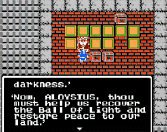 (NES, 1989) For me, the summer of 1990 (or maybe it was '91, my memory's slipping) was the Summer of Dragon Warrior. Nintendo Power magazine ran a promotion that gave free copies of the game to new subscribers -- my cousin Brian happened to be one of those, and together we saved the land from the evil Dragonlord. He did the actual playing while I sat nearby and offered advice. It was a blast. The plot of the game is fairly typical -- an evil sorcerer is threatening the world, and you have to stop him, and oh by the way, the princess has been kidnapped, too. The dialogue is an (unintentionally) hilarious mix of Middle English (lots of thous and thees) and badly translated Japanese gibberish. But it's great fun -- roaming around the countryside, beating up slimes (and their evil counterparts, Metal Slimes, the bane of our existence) by the dozens, and learning exotic spells like HEAL and HEALMORE (and HURT and HURTMORE). More importantly, this was the first RPG I ever played -- a little masterpiece that opened the door to much bigger things. Like...
(NES, 1989) For me, the summer of 1990 (or maybe it was '91, my memory's slipping) was the Summer of Dragon Warrior. Nintendo Power magazine ran a promotion that gave free copies of the game to new subscribers -- my cousin Brian happened to be one of those, and together we saved the land from the evil Dragonlord. He did the actual playing while I sat nearby and offered advice. It was a blast. The plot of the game is fairly typical -- an evil sorcerer is threatening the world, and you have to stop him, and oh by the way, the princess has been kidnapped, too. The dialogue is an (unintentionally) hilarious mix of Middle English (lots of thous and thees) and badly translated Japanese gibberish. But it's great fun -- roaming around the countryside, beating up slimes (and their evil counterparts, Metal Slimes, the bane of our existence) by the dozens, and learning exotic spells like HEAL and HEALMORE (and HURT and HURTMORE). More importantly, this was the first RPG I ever played -- a little masterpiece that opened the door to much bigger things. Like...
15. Kingdom Hearts
 (PS2, 2002) The craziest game ever made. Try and wrap your brain around this one: the moody, depressed characters from the Final Fantasy universe sharing screen time with...Goofy and Donald Duck? That's right -- some looney at Square thought this would be a good idea, and it so totally is. Disney and Final Fantasy collide in a game that's part RPG, part Zelda-esque adventure, all insane. (I won't even mention the spaceship shoot-'em-up stuff between stages.) There's a sidetrip into Pooh Corner, and even a stage where you find yourself in The Nightmare Before Christmas. Great graphics, beautiful music, and an all-star voice cast (including Haley Joel Osment, James Woods, and Billy Zane), Kingdom Hearts is a masterpiece in all its glorious weirdness. The only mistakes are the pointless spaceship stuff I mentioned earlier, the slightly confusing story, and the profoundly annoying Little Mermaid level, which goes beyond "difficult" and swims into "stroke-inducing." But the game more than makes for that stuff with the fantastic boss battles -- go toe-to-toe with Malificent from Sleeping Beauty! Then fight her again when she turns into a dragon! Then fight the hideous demon from the "Night on Bald Mountain" sequence from Fantasia! Take out Captain Hook and Jafar, with the help of the Genie, Simba, and Bambi (yes, that Bambi)! Seriously, even if you don't like RPGs, this is worth a shot, if only for the vision of seeing Donald Duck try to coexist with Sephiroth.
(PS2, 2002) The craziest game ever made. Try and wrap your brain around this one: the moody, depressed characters from the Final Fantasy universe sharing screen time with...Goofy and Donald Duck? That's right -- some looney at Square thought this would be a good idea, and it so totally is. Disney and Final Fantasy collide in a game that's part RPG, part Zelda-esque adventure, all insane. (I won't even mention the spaceship shoot-'em-up stuff between stages.) There's a sidetrip into Pooh Corner, and even a stage where you find yourself in The Nightmare Before Christmas. Great graphics, beautiful music, and an all-star voice cast (including Haley Joel Osment, James Woods, and Billy Zane), Kingdom Hearts is a masterpiece in all its glorious weirdness. The only mistakes are the pointless spaceship stuff I mentioned earlier, the slightly confusing story, and the profoundly annoying Little Mermaid level, which goes beyond "difficult" and swims into "stroke-inducing." But the game more than makes for that stuff with the fantastic boss battles -- go toe-to-toe with Malificent from Sleeping Beauty! Then fight her again when she turns into a dragon! Then fight the hideous demon from the "Night on Bald Mountain" sequence from Fantasia! Take out Captain Hook and Jafar, with the help of the Genie, Simba, and Bambi (yes, that Bambi)! Seriously, even if you don't like RPGs, this is worth a shot, if only for the vision of seeing Donald Duck try to coexist with Sephiroth.
14. SimCity
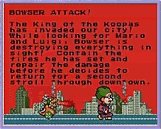 (PC & SNES, 1989) What a revelation this game was for me: no set goals, no enemies to defeat, nothing to accomplish. The only benchmarks are those you set for yourself. A totally open-ended experience. Suffice to say this blew my mind when I discovered it as a teenager (both in the original computer version and the SNES revamp). Build the city of your dreams from the ground up and watch it grow before your eyes. And if you get bored, or the citizens won't stop bitching about the traffic downtown, you can just drop an earthquake on 'em -- that'll reevaluate their priorities. Further releases of the game complicate the proceedings but lose none of the fun. A brilliant, off-the-wall game that goes against every video game sterotype you can think of.
(PC & SNES, 1989) What a revelation this game was for me: no set goals, no enemies to defeat, nothing to accomplish. The only benchmarks are those you set for yourself. A totally open-ended experience. Suffice to say this blew my mind when I discovered it as a teenager (both in the original computer version and the SNES revamp). Build the city of your dreams from the ground up and watch it grow before your eyes. And if you get bored, or the citizens won't stop bitching about the traffic downtown, you can just drop an earthquake on 'em -- that'll reevaluate their priorities. Further releases of the game complicate the proceedings but lose none of the fun. A brilliant, off-the-wall game that goes against every video game sterotype you can think of.
13. Street Fighter II: The World Warrior
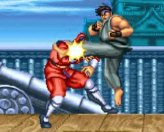 (arcade, 1991) Down. Down-Forward. Forward. Punch. "HADOKEN!"
(arcade, 1991) Down. Down-Forward. Forward. Punch. "HADOKEN!"
Lack of quarters and transportation kept me of out of arcades when I was kid. But I made more than one trip to the mall just to get a shot at Street Fighter II. I tried it the first time because I overheard a friend talking about how to throw Ken's fireball -- so I stuck in a quarter and became instantly hooked. The genre of fighters is pretty well played-out these days (thanks largely to the vastly inferior Mortal Kombat series), but Street Fighter II is still the best of them all. The colorful personalities of the different fighters, their various trademark moves and combos -- a friend and I once remarked that the game was kinda like Punch-Out!!, only without Little Mac: everyone was a badass. Except for Balrog, he's a wuss (oddly enough, considering his name). The game was eventually rereleased about a billion times (Street Fighter II: Championship Edition! Street Fighter II: Turbo! Super Street Fighter II!), but the original was just fine with me.
12. Tetris
 (every system ever, from now to infinity) If it's got a screen and some buttons, you can be assured that some version of Tetris will be released for it. It's the most universal game ever created, one that's instantly understandable, yet challenging enough to entice anyone. Why? Because there is beauty in simplicity. The premise of this game sure seemed dumb when I first heard it: all you do is make lines with blocks? That's it? That's easy! Um, no, it's not, actually. Damn the Russians and their tricky puzzle masterpiece. I bought a Gameboy so I could play Battletoads (yeah, Battletoads, what?), but I ended up keeping it to play Tetris. That is, when my mother wasn't stealing it to play herself. The most addictive game ever made, period.
(every system ever, from now to infinity) If it's got a screen and some buttons, you can be assured that some version of Tetris will be released for it. It's the most universal game ever created, one that's instantly understandable, yet challenging enough to entice anyone. Why? Because there is beauty in simplicity. The premise of this game sure seemed dumb when I first heard it: all you do is make lines with blocks? That's it? That's easy! Um, no, it's not, actually. Damn the Russians and their tricky puzzle masterpiece. I bought a Gameboy so I could play Battletoads (yeah, Battletoads, what?), but I ended up keeping it to play Tetris. That is, when my mother wasn't stealing it to play herself. The most addictive game ever made, period.
11. Final Fantasy IV
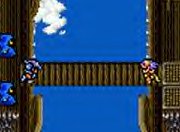 (SNES, 1991) Weighted by the guilt of a thousand sins, betrayed by all those close to him, abandoned in his most dire hour, a solider purges the darkness from his soul and embraces a life of light and good. Dragon Warrior was the first RPG I played, but it wasn't long after that I discovered Final Fantasy IV and felt transformed: here, unbelievably, was a game with a story I, somehow, actually cared about. This was truly bizarre. When Palom and Porom, the wizard twins, sacrifice their lives to save the rest of the group...so help me, I gave a damn, an experience entirely unknown to me at the time as far as games went. For a time, Final Fantasy IV was everything a video game could be, which is probably why I'm so forgiving of the way it goes totally bonkers at the end, with the trips to the moon (made of pudding!) and the alien colonization plot and everything. I'm also willing to overlook some spotty Engrish translations ("You spoony bard!") in light of its emotional triumphs. And then, the bastards at Square went and outdid themselves...
(SNES, 1991) Weighted by the guilt of a thousand sins, betrayed by all those close to him, abandoned in his most dire hour, a solider purges the darkness from his soul and embraces a life of light and good. Dragon Warrior was the first RPG I played, but it wasn't long after that I discovered Final Fantasy IV and felt transformed: here, unbelievably, was a game with a story I, somehow, actually cared about. This was truly bizarre. When Palom and Porom, the wizard twins, sacrifice their lives to save the rest of the group...so help me, I gave a damn, an experience entirely unknown to me at the time as far as games went. For a time, Final Fantasy IV was everything a video game could be, which is probably why I'm so forgiving of the way it goes totally bonkers at the end, with the trips to the moon (made of pudding!) and the alien colonization plot and everything. I'm also willing to overlook some spotty Engrish translations ("You spoony bard!") in light of its emotional triumphs. And then, the bastards at Square went and outdid themselves...
10. Final Fantasy VI
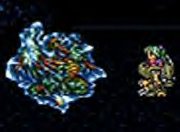 (SNES, 1994) Last time I wrote this list, I had IV before VI; really, the two are practically tied. But another run through Final Fantasy VI reminded of how truly awe-inspiring it is: just the scope of the thing is breathtaking. Featuring a gargantuan story with a starring cast of over a dozen player characters (and no one true central character, either), it feels like an interactive novel where you fight stuff. With beautiful music, dazzling set pieces -- including, most gloriously, one in which you must guide a character through an opera -- and an immensely intricate world that you watch die and regrow again, FF6 is a bold vision of what RPGs (and video games in general) are capable of. All of the characters are fantastic, but I have to give special attention to the villains, two of the best in gaming history. There's Ultros, the Snidley Whiplash-like purple octopus who drops in to provide death threats and comic relief. But towering over him and everyone else is the man himself, who's still cackling at you from my website's banner: Kefka. Previous (and even future) Final Fantasy villains were dark, moody, almost morose figures; but Kefka turned the volume up about twenty notches on sheer personality alone. He was funny, he was flashy, he cackled at everything -- Kefka was a lot more fun than the good guys. So what if the game starts to repeat itself toward the end? If only all games were as grand as this one. And yet -- those magnificent bastards at Square were still just warming up.
(SNES, 1994) Last time I wrote this list, I had IV before VI; really, the two are practically tied. But another run through Final Fantasy VI reminded of how truly awe-inspiring it is: just the scope of the thing is breathtaking. Featuring a gargantuan story with a starring cast of over a dozen player characters (and no one true central character, either), it feels like an interactive novel where you fight stuff. With beautiful music, dazzling set pieces -- including, most gloriously, one in which you must guide a character through an opera -- and an immensely intricate world that you watch die and regrow again, FF6 is a bold vision of what RPGs (and video games in general) are capable of. All of the characters are fantastic, but I have to give special attention to the villains, two of the best in gaming history. There's Ultros, the Snidley Whiplash-like purple octopus who drops in to provide death threats and comic relief. But towering over him and everyone else is the man himself, who's still cackling at you from my website's banner: Kefka. Previous (and even future) Final Fantasy villains were dark, moody, almost morose figures; but Kefka turned the volume up about twenty notches on sheer personality alone. He was funny, he was flashy, he cackled at everything -- Kefka was a lot more fun than the good guys. So what if the game starts to repeat itself toward the end? If only all games were as grand as this one. And yet -- those magnificent bastards at Square were still just warming up.
9. The Legend of Zelda: A Link to the Past
 (SNES, 1992) If Battletoads was why I bought a Gameboy (and that sounds really, really stupid looking back on it), then Zelda was the reason I begged for a Super Nintendo. This game, though, was worth it. A mammoth quest across multiple worlds to save the Triforce from the hands of the evil Ganon, and (of course) save the princess. Of course, you manage to save her in the first twenty minutes of the game, which threw me for a loop back then and is part of the genius at work here. Events grow immensely more complicated from there, naturally, and by the end, I didn't want the game to stop. Not only one of my favorites, but easily one of the best games ever made. The only weak point is that it can't quite stand up to the original...which we'll get to shortly.
(SNES, 1992) If Battletoads was why I bought a Gameboy (and that sounds really, really stupid looking back on it), then Zelda was the reason I begged for a Super Nintendo. This game, though, was worth it. A mammoth quest across multiple worlds to save the Triforce from the hands of the evil Ganon, and (of course) save the princess. Of course, you manage to save her in the first twenty minutes of the game, which threw me for a loop back then and is part of the genius at work here. Events grow immensely more complicated from there, naturally, and by the end, I didn't want the game to stop. Not only one of my favorites, but easily one of the best games ever made. The only weak point is that it can't quite stand up to the original...which we'll get to shortly.
8. Super Mario World
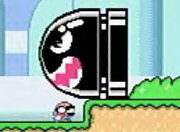 (SNES, 1991) Man, I'd kill to be in the room for this Nintendo board meeting. "We need to spruce up Mario for the Super Nintendo." "Let's throw in a green dinosaur named Yoshi who eats everything. You could ride him like a horse!" "My god, man, that's brilliant!" And it is brilliant, because Yoshi does add a whole new dimension to the still-so-addictive-it-should-be-illegal gameplay. Of course, soon the poor guy would become so unforunately ubiquitous that I could barely stand to look at him anymore, but in his first appearance, he was still enormous fun. Eat a red Koopa shell, he spits fire. Eat a blue one, he flies. There are even Yoshis of various colors -- collect 'em all! Of course, the innovation didn't stop with Yoshi -- the world across which Mario hopped was bigger than ever before, with secret exits everywhere leading to various hidden levels. The ultimate gamer challenge was to find and defeat all 90+ levels of Super Mario World; I even heard a guy on Jeopardy! once list it as one of his great accomplishments (I am sad to say that I fell one level short, myself). Pure gamer heaven. And, like the previous entry, this wasn't even the best Mario had to offer.
(SNES, 1991) Man, I'd kill to be in the room for this Nintendo board meeting. "We need to spruce up Mario for the Super Nintendo." "Let's throw in a green dinosaur named Yoshi who eats everything. You could ride him like a horse!" "My god, man, that's brilliant!" And it is brilliant, because Yoshi does add a whole new dimension to the still-so-addictive-it-should-be-illegal gameplay. Of course, soon the poor guy would become so unforunately ubiquitous that I could barely stand to look at him anymore, but in his first appearance, he was still enormous fun. Eat a red Koopa shell, he spits fire. Eat a blue one, he flies. There are even Yoshis of various colors -- collect 'em all! Of course, the innovation didn't stop with Yoshi -- the world across which Mario hopped was bigger than ever before, with secret exits everywhere leading to various hidden levels. The ultimate gamer challenge was to find and defeat all 90+ levels of Super Mario World; I even heard a guy on Jeopardy! once list it as one of his great accomplishments (I am sad to say that I fell one level short, myself). Pure gamer heaven. And, like the previous entry, this wasn't even the best Mario had to offer.
7. Riven: The Sequel to Myst
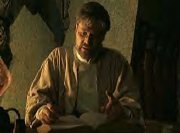 (PC, 1997) Myst exploded on the gaming world like a bomb: here was a game where you didn't kill anyone, you couldn't die -- you just explored a beautiful world. You weren't playing a character -- you were yourself. How do you react in this situation? What do you do? It caused a sensation, and for a period was the best-selling video game of all time. Riven, the beautiful sequel, improves upon that and a whole lot more. This game requires more abstract thought and puzzling than any other game I've ever played -- in Myst, the puzzles consisted of basically moving switches around until you found the right pattern; Riven required you to discern the mathematical foundation of an entire culture, among other things. And that shines a light on my favorite aspect of Riven: its totality of purpose. Rarely has a fictional world felt as real as this one does. The segment when the player must learn how to count in D'ni could have been handled a million different ways -- the one the creators chose was terrifying, unforgettable, and seared those numbers into your brain. And yet it felt completely natural, completely appropriate, another perfectly understandable part of a rich world. And through it all, you explored the most gorgeous world imaginable, with no clumsy interface to get in the way of your immersion. If you want to move something, click on it. That's all. Like I said before: there is beauty in simplicity.
(PC, 1997) Myst exploded on the gaming world like a bomb: here was a game where you didn't kill anyone, you couldn't die -- you just explored a beautiful world. You weren't playing a character -- you were yourself. How do you react in this situation? What do you do? It caused a sensation, and for a period was the best-selling video game of all time. Riven, the beautiful sequel, improves upon that and a whole lot more. This game requires more abstract thought and puzzling than any other game I've ever played -- in Myst, the puzzles consisted of basically moving switches around until you found the right pattern; Riven required you to discern the mathematical foundation of an entire culture, among other things. And that shines a light on my favorite aspect of Riven: its totality of purpose. Rarely has a fictional world felt as real as this one does. The segment when the player must learn how to count in D'ni could have been handled a million different ways -- the one the creators chose was terrifying, unforgettable, and seared those numbers into your brain. And yet it felt completely natural, completely appropriate, another perfectly understandable part of a rich world. And through it all, you explored the most gorgeous world imaginable, with no clumsy interface to get in the way of your immersion. If you want to move something, click on it. That's all. Like I said before: there is beauty in simplicity.
6. Half-Life
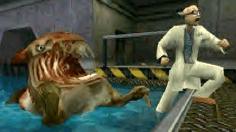 (PC, 1998) First-person shooters are supposed to be about blowing aliens to bits with various fancy weapons. They're supposed to be about random death and violence. They're not supposed to be about a gripping story. But apparently the folks at Valve never got the memo, because the shining point of Half-life is the remarkable story. The hero, Gordon Freeman, is no musclebound soldier, no macho marine -- he's a scientist. A quantum physicist at that. But when a hellish portal to another world opens and pissed-off aliens come storming out, Gordon's the only one left to stop them. You're stuck at the bottom of the Black Mesa Research Facility, and you have to get to the surface to find help for those still trapped below. Another wonderful touch: unlike most other FPSs, you're not alone. You run into other scientists, who can heal you and open doors, and security guards will stand and fight...until they're (inevitably) killed by the powerful aliens. There are no level breaks -- when you finish a chapter of the game, the title of the new chapter pops up and you keep playing with no interruption. The cutscenes are all integrated into the actual gameplay; it's brilliant. The effect is a level of intensity that few games can match, and things get no easier once you meet the Marine unit on its way down -- their plan to stop the alien invasion is to wipe out everyone in the base, you included. And what starts as a professional mission to take you out soon becomes personal after you single-handedly take out several squads: you find messages like "YORE DEAD FREEMAN" spray-painted on walls. So you've got a three-way showdown between a physicist, the Marines, and the aliens. And it's the geek who wins. I love video games.
(PC, 1998) First-person shooters are supposed to be about blowing aliens to bits with various fancy weapons. They're supposed to be about random death and violence. They're not supposed to be about a gripping story. But apparently the folks at Valve never got the memo, because the shining point of Half-life is the remarkable story. The hero, Gordon Freeman, is no musclebound soldier, no macho marine -- he's a scientist. A quantum physicist at that. But when a hellish portal to another world opens and pissed-off aliens come storming out, Gordon's the only one left to stop them. You're stuck at the bottom of the Black Mesa Research Facility, and you have to get to the surface to find help for those still trapped below. Another wonderful touch: unlike most other FPSs, you're not alone. You run into other scientists, who can heal you and open doors, and security guards will stand and fight...until they're (inevitably) killed by the powerful aliens. There are no level breaks -- when you finish a chapter of the game, the title of the new chapter pops up and you keep playing with no interruption. The cutscenes are all integrated into the actual gameplay; it's brilliant. The effect is a level of intensity that few games can match, and things get no easier once you meet the Marine unit on its way down -- their plan to stop the alien invasion is to wipe out everyone in the base, you included. And what starts as a professional mission to take you out soon becomes personal after you single-handedly take out several squads: you find messages like "YORE DEAD FREEMAN" spray-painted on walls. So you've got a three-way showdown between a physicist, the Marines, and the aliens. And it's the geek who wins. I love video games.
5. Metal Gear Solid 2: Sons of Liberty
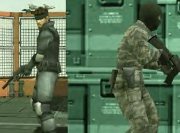 (PS2, 2001) Solid Snake's second 3D adventure triumphs over the first -- and pretty much everything else in the world, too -- because of its intellectual and philosophical aspirations: not content to be merely an immensely enjoyable action game with infinite replay value, Metal Gear Solid 2 slowly but surely becomes an intense meditation on video games themselves. Not just breaking the fourth wall, Hideo Kojima's masterpiece kicks it over and howls with laughter -- the line between character and player is blurred to the point of being indistinguishable. How else to explain the bizarre moments near the end, with the AI going crazy and sending you radio messages like, "You've been playing for an awfully long time -- turn the game off right now!"? The story stretches, cracks, and then, finally, vaporizes suspension of disbelief, from the intrusive GAME OVER screens that pop up out of nowhere to the odd in-character game-saving. ("How do I check in and save my progress?" is a line of dialogue I never through I'd hear.) And what of Raiden, the much-despised player character who occupies most of the game? Hmm. No social skills? Can't keep his girl happy? No experience in the real world? Educated with video simulations? In complete awe of Solid Snake? And a really, really big dork? He's you, Mr. Video Game Geek, Kojima's penetrating caricature of his fanbase (who, surprise, absolutely loathed Raiden). Those who doubt would do well to recall how Raiden met his girlfriend, Rose: that's right, they were bickering and arguing about movies. Hell, he has the same name as a Mortal Kombat character! But even without all that, MGS2 is a masterpiece for its endlessly inventive gameplay: defusing bombs, collecting dog tags, and finding creative uses for the directional microphone are just some of the things that make this one great. And there's even the Substance version, which adds a whole bunch of really fun extras. I'll be playing this one forever.
(PS2, 2001) Solid Snake's second 3D adventure triumphs over the first -- and pretty much everything else in the world, too -- because of its intellectual and philosophical aspirations: not content to be merely an immensely enjoyable action game with infinite replay value, Metal Gear Solid 2 slowly but surely becomes an intense meditation on video games themselves. Not just breaking the fourth wall, Hideo Kojima's masterpiece kicks it over and howls with laughter -- the line between character and player is blurred to the point of being indistinguishable. How else to explain the bizarre moments near the end, with the AI going crazy and sending you radio messages like, "You've been playing for an awfully long time -- turn the game off right now!"? The story stretches, cracks, and then, finally, vaporizes suspension of disbelief, from the intrusive GAME OVER screens that pop up out of nowhere to the odd in-character game-saving. ("How do I check in and save my progress?" is a line of dialogue I never through I'd hear.) And what of Raiden, the much-despised player character who occupies most of the game? Hmm. No social skills? Can't keep his girl happy? No experience in the real world? Educated with video simulations? In complete awe of Solid Snake? And a really, really big dork? He's you, Mr. Video Game Geek, Kojima's penetrating caricature of his fanbase (who, surprise, absolutely loathed Raiden). Those who doubt would do well to recall how Raiden met his girlfriend, Rose: that's right, they were bickering and arguing about movies. Hell, he has the same name as a Mortal Kombat character! But even without all that, MGS2 is a masterpiece for its endlessly inventive gameplay: defusing bombs, collecting dog tags, and finding creative uses for the directional microphone are just some of the things that make this one great. And there's even the Substance version, which adds a whole bunch of really fun extras. I'll be playing this one forever.
4. Super Mario Bros. 3
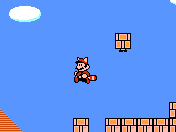 (NES, 1990) A game so great that made an entire movie just to be a commercial for it. No, really -- it was called The Wizard and starred Fred Savage, Beau Bridges and Christian Slater.
(NES, 1990) A game so great that made an entire movie just to be a commercial for it. No, really -- it was called The Wizard and starred Fred Savage, Beau Bridges and Christian Slater.
The best installment of the Mario series is also the most insane. In addition to mushrooms that increase your size and flowers that cause pyrokinesis, now here's a maple leaf that turns you into a raccoon (?), which naturally allows you to fly (?!). But this game is so beyond merely fun that you won't notice the insanity. Guide everyone's favorite plumber across deserts, ice-covered worlds, worlds made of pipes, and worlds where everything was huge (Giant World, I think it was called). The goal, of course, is to save the princess again. But Nintendo added another awesome little touch to enhance the multiplayer game -- you could challenge your partner for control, sending the two of you into a one-on-one remake of the original Mario Bros. And along the way, there was other fun stuff to do: hey, here's a hut where you play a memory game to win power-ups! Hey, here's a place where you can play a slot machine to win extra lives! And you could also pick up the ultimate power-up in one level: the shoe. It was called Kuribo's Shoe, or something, and I don't remember why, but it's a big green shoe that Mario sat inside and jumped around and stuff. It sounds dumb, it looked dumb, but it's just another great touch in an already brilliant game. Totally insane, of course, but you wouldn't expect anything less from Mario.
3. Silent Hill 2
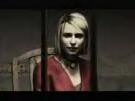 (PS2, 2001) Atmosphere (at"mos*phere): a distinctive but intangible quality surrounding a person or thing.
(PS2, 2001) Atmosphere (at"mos*phere): a distinctive but intangible quality surrounding a person or thing.
The sleepy resort town of Silent Hill definitely has atmosphere, but probably not the one the town planners were hoping for. It's an air of dread. Fear. Hopelessness. That everything that could go wrong has already gone wrong, and that your sanity will be the next thing to crumble and fall away. A satanic cult took over the town by using hallucinogenic drugs to control the populace, then attemped to call forth their dark god. They failed (as documented in the original Silent Hill, and mercifully clarified in Silent Hill 3), but they did manage to leave Silent Hill a dark, foggy place where the old gods hold sway. Where the innocent are sacrificed for evil purposes. Where a steel-gray fog swallows the light and hides demonic things that await you in the shadows.
But before all that, Silent Hill was a popular vacation spot. Years ago, James Sunderland brought his ailing wife, Mary, to the Lakeview Hotel for a time of peace and quiet before her inevitable death. She loved it there, and begged James to take her back someday. He promised to...but the illness (which is never named) claimed her too quickly. For the three years since then, James has lived in a grief-stricken stupor, desperately trying to find a purpose for his existence now that his beloved is gone.
But one day, James gets a letter from...Mary? Her name is on the outside. It appears to be in her handwriting. She's waiting for James in Silent Hill...in their "special place." James returns to the seaside resort, desperate to find someone, anyone, who can give him answers.
Silent Hill 2 is a powerful examination of guilt, the destructive nature of the past, and the horrible things people can do -- not only to each other, but themselves. James meets other loners like him inside the city limits -- Angela, a frightened and confused woman on the verge of suicide, shattered by an abusive childhood; Eddie, a violent paranoid who lashes out in fear at those who try (at least in his eyes) to hurt him; and, most disturbingly, a sexy young woman named Maria, who bears an unmistakable resemblance to Mary. He almost must fight off scores of deadly, unimaginable monsters...monsters only he seems to see.
It almost sounds like I'm describing a book or a movie rather than a video game, and that's what Silent Hill 2 feels like -- this quality of story is unheard of in the realm of video games, at least outside of RPGs. As you follow James in his quest to reunite with his wife, the plot twists and turns in remarkable ways. The town itself is very much a character -- personalized messages are written to James in blood on the walls, fragments of the town's bloody past take form and attack him, and at one point he finds himself in a geographically impossible reconstruction of a 200-year-old prison. He also must solve increasingly difficult puzzles, which can try the patience and logic of even the most experienced gamer.
The graphics are excellent. Everything looks grainy and washed-out, which is intentional -- the makers of the game created perfect images, then coated everything with a darkened filter to add to the atmosphere. The music is rarely traditional music at all, but a cacophony of sounds that build the player's fear and dread as more hideous demons are lit by James's weak flashlight (the only source of light in most of the game).
But my favorite elements of the game, as I said, are the atmosphere and the story. By the time James makes it back to the Lakeview Hotel, it's clear that his memories of the last three years may not be accurate...and may indeed be wholly fabricated. He faces painful confrontations with Eddie and Angela, each accusing him of horrible sins. This all builds to a jaw-dropping final twist, which then further builds to a stunning finale that may be either heartwarming or heartbreaking. See, there are several different endings: some sad, some happy, and some a very uncomfortable mix of both. And which ending you see depends on how you behave during the game -- if James runs around destroying everything and appearing to care little for his own safety, you'll get one ending. Treat Maria in a certain manner, you'll get another. There is no "right" ending -- each one is a justifiable conclusion to the story, though some are happier than the others.
Everything in the game builds upon the story and the themes. Nothing is thrown in just because it "looks cool" or to get a cheap scare. The forms the monsters take all echo the torment James has undergone; puzzle clues speak of guilt, crime, sin, and redemption. The result is a powerfully moving experience like no other. If any video game can truly be called a work of art, I declare Silent Hill 2 that game.
Along with these next two, of course.
2. The Legend of Zelda
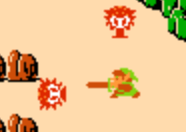 (NES, 1987) If Mario was my childhood crack cocaine, then Zelda was heroin. I did everything I could to get my hands on this game. I borrowed it from friends. I saved up nickels for months to rent it for two days. I distinctly remember pretending to be sick once to get out of school so I could play it.
(NES, 1987) If Mario was my childhood crack cocaine, then Zelda was heroin. I did everything I could to get my hands on this game. I borrowed it from friends. I saved up nickels for months to rent it for two days. I distinctly remember pretending to be sick once to get out of school so I could play it.
There is trouble in Hyrule. Gannon, an evil wizard/criminal/overall bad guy has stolen one half of the mystical Triforce, a crystal that would allow its owner to rule the world. He has the Triforce of Power; in an attempt to get the Triforce of Wisdom, he has...wait for it...kidnapped the Princess! In this case, Princess Zelda of Hyrule. See, Zelda saw all this Gannon shit coming, and, fearing no one could stop him, broke the Triforce of Wisdom into eight pieces, and buried each in a different dungeon. So Gannon steals the Princess -- damn those incompetent royal guards -- while Hyrule tries to find a hero to save the day. That hero is you: Link. Your goal is to find the eight hidden pieces of the Triforce, then head to Gannon's lair and defeat him once and for all. (Yes, to beat the Triforce-of-Power-enhanced Gannon, you need the Triforce of Wisdom. Which is exactly what he wants. It's like how the only way to destroy the One Ring was by taking it right to the guy who wanted it.)
But you aren't exactly the best-equipped hero of all time. You start out with no weapons. A generous old man hands you a wooden sword, which is about as useful as it sounds. And apparently only Zelda knew where these dungeons were, because you start off with no idea what to do. Your only way to find your place in Hyrule is your map: a featureless grey rectangle. Oh-kay. And if the swarms of monsters overcome poor Link and reduce his health to zero...that's right, it's back to the beginning with you, kid (though if you happened to die while in a dungeon, you only had to go back to the beginning of the dungeon). The good folks of Hyrule basically just give Link a shield, point him in the vague direction of Zelda, and say, "Go get 'em, tiger!"
In case you haven't realized, this game is frickin' hard. They invented a battery pak for the game that allowed you to save your progress, realizing that no one could possibly beat this thing in one (or two or three, for that matter) sittings. When we were kids, the rumor was that the game was actually unbeatable. And not like Punch-Out!!, either, but a game that was literally impossible to defeat. This was untrue, of course -- but not by much. From what I understand, Zelda pretty much made Nintendo's tip hotline a success all by itself.
Along your quest, you don't get much help. In fact, you really get no help at all. A few guys offer to give you better swords once you've "mastered using" the old ones; also, you find various incarnations of that same Generous Old Man hidden away in caves and dungeons, giving you tips. Unfortunately, he speaks in Garbled Japanese-to-English, which comes out in phrases like, "Easternmost penninsula is the secret." I guess he didn't want to be too much of a spoiler.
The music for the game is spectacular. Really, the main Overworld theme is one of the best pieces of music ever crafted for a video game, and the dungeon theme is one my favorite pieces of music, period. The graphics are understandably less-than-stellar, what with it being 1987 and all, but the programmers make the most of it. The seams are noticable: to save space, the animation of Link stabbing with his sword is represented with three sprites -- one stabbing up, one stabbing down, and one stabbing to the right. To stab left, they simply flipped the right-stab sprite around. This results in Link always being right-handed, except when attacking left, when he suddenly flips around and becomes a southpaw. (Ingeniously, they even explained this away as backstory: haunted Death Mountain lies to the north, and superstitious folk -- like Link -- have made it a habit to always keep their shield pointed north. So, when facing west, he flips his gear around to stay protected. I love this game.)
The difficulty, at least for the time, was well beyond extreme. But one always seems to die just before accomplishing a difficult task -- the player growls, "Oh, I was thisclose," hits continue, and tries again. This repeats until family members remove the controller from the player's hands. And in the event that trekking through eight dungeons and then Gannon's fortress was not enough for you, The Legend of Zelda is the game that invented replay value: assuming you pulled off the nigh-impossible task of beating the game in the first place, you unlocked the Second Quest, where everything was moved around and (somehow) made even more difficult. Good luck with that one.
I first played Zelda when I was six years old, and from that moment on, it represented the very pinnacle of video games. Nothing could better it -- not even the extraordinary sequels, each excellent in their own right. Nothing could top the original Legend of Zelda.
Until...
1. Chrono Trigger
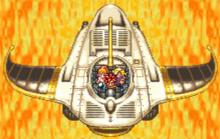 (SNES, 1995) The winner, and still champion. Chrono Trigger.
(SNES, 1995) The winner, and still champion. Chrono Trigger.
I remember sitting on the couch watching TV one day with a friend of mine. A commerical came on for a game by Square, who made the Final Fantasy series. And this game looked kinda like those, but not quite -- characters were no longer miniature sprites, but bigger, more detailed, better-looking. I can't remember a thing about this commerical, other than the fact that the voiceover was in Japanese (English subtitles translated everything for us). And the only phrase I remember is the one the guy shrieked over and over again: "CHRONO TRIGGER~!" For weeks, my friend and I could make each other laugh by breaking the silence with a well-timed "CHRONO TRIGGER~!"
And then we played the game. And we started yelling "CHRONO TRIGGER~!" for different reasons.
This is the greatest game ever made. Fantasy RPG meets sci-fi epic meets slapstick comedy meets medieval romance. Talking frogs with swords and dancing Cro-magnons and evil robots and wizards and bike races and mutants and a million other extraordinary things. Combined with stunning graphics and a beautiful score, a moving story and innovative gameplay, it reinvigorated my love for video games and is definitely my favorite game of all time.
You play as Crono, a teenaged resident of Truce village, a sleepy seaside town in the year 1000 AD. Like most boys in Japanese video games, you have bright red punk-rocker hair and love swords. You also never, ever speak -- never once in the game is Crono's dialogue displayed (guess he's the strong, silent type). Life is pretty good -- you live with your mom (the identity and location of your father a mystery lost to time) and hang out with Lucca, the brainy chick down the road, whom everyone makes fun of because she's smarter than they are. She's an inventor, and is unveiling her new invention at the Millenial Fair -- not only is it a celebration of the millenium (duh), but the 400-year anniversary of the defeat of Magus, an evil magician who attempted to take over the world. So you head to the fair, playing a few games, betting on the footrace, taking a peek inside the Tent of Horrors. But before you can check out Lucca's new toy, you (literally) run into a beautiful yet vaguely familiar-looking girl named Marle. The two of you hit it off (since she never stops talking and you never start) and head off to see Lucca together. And then...
Man, I don't want to give anything else away, because slowly discovering the great story is half the fun of the game, but I kinda have to in order to talk about the great stuff that follows. See, Lucca's invention is a teleporter -- zaps you from point A to point B, Star Trek-style. (And she's invented this in the year 1000 AD. I told you she was smarter than everyone else.) You volunteer to get zapped, and it works fine, but when Marle hops on, the crystal in her shiny pendant gums up the works and tears a hole in the space-time continuum. Marle gets sucked through to the year 600 AD, and it's up to you to go back and find her. This sets off a series of jumps around the timeline, ranging from prehistoric times to the ice age all the way to the very End of Time itself. One of these trips lands you in a devasted post-apocalyptic future, where you learn than in 1999, a hideous beast known only as Lavos rose from the ground and set the world on fire. Realizing that only you have the power to stop the end of the world, you band together to prevent the "Day of Lavos" from ever happening.
The game is full of endless surprises. Your first few minutes of gameplay, for example, certainly seem pointless: you just run around the fair with Marle, talking to people and learning the battle system by fighting a giant rapping robot. But when the plot twists against you (in an hilarious turn on the well-worn "the princess has been kidnapped" story), you find yourself on trial, and those activities come back to haunt you. Did you steal the old man's lunch? He'll show up to testify against you. Try to steal Marle's pendant? That won't impress the jury. Of course, if you help a cute little girl find her cat, she'll help you out. And then there's your trip across the wasteland of 2300 AD -- at one point, you find yourself surrounded by vicious-looking robots...but they turn out not to be fighters, but sycophantic cheerleaders for another robot named Johnny ("THE MAN!"), who doesn't want to fight, he wants to race, man! So you can hop on a speeder bike and race him across the ruins.
The fighting system is remarkably innovative. It's still your standard turn-based fighting, like most RPGs. But Chrono Trigger has none of the widely-detested "random battles" found in the Final Fantasy titles. In those games, monsters would suddenly show up out of nowhere to fight you in a battle you had no chance to avoid, but in Chrono Trigger, one can almost always see the monsters beforehand, and usually avoid a confronation. And while magic is a big part of the game (taught to you by a egomaniac named Spekkio who lives at the End of Time), you're also allowed Double- and Triple-techs: party members can team up to deliver devastating punishment to their enemies.
The fluid nature of a time is a big part of the game, and it's fun to watch as your actions have effects that ripple through the time stream. Even little things -- a young girl in 12000 B.C. asks whether she should she should keep a small plant or burn it. Your answer may or may not cause a giant desert to appear thousands of years later. You'll meet the rather rude and greedy mayor of a small town; teach his ancestor the value of kindness and generosity, and you'll find the mayor a much nicer guy. And hanging over it all is the shadow of Lavos -- you can pick your fight with it anytime you want to via a portal (inside a bucket) at the End of Time, rather than waiting for the end of the story (go too early though, and it'll crush you into tiny pieces -- I'd wait).
But no discussion of Chrono Trigger would be complete without its most memorable features -- the New Game+ and the multiple endings. If you've been a good player, and marched through the mighty Black Omen fortress to get to Lavos (rather than taking the quick route through the bucket), you'll unlock the special New Game+ feature, which allows you to start a new game with all your old levels, items, weapons, and Techs. Cool! And the New Game+ allows you unlock all THIRTEEN (yeah, 13) endings of the game -- ye gods! Depending on when in the timeline you take out Lavos, you'll get a different conclusion to the story; this includes the much-beloved "Dream Project" ending, where you get to talk to the various progammers of the game. Other bonus endings remark on the fluid timeline once again -- defeat Lavos before helping prehistoric humans defeat their Reptite usurpers, and the future will find the world overrun by humanoid dinosaurs. There's also the dreaded Lavos Ending, displayed should Lavos defeat you -- you watch, helpless, as the giant creature destroys the world. Lavos doesn't say, "BWAHAHAHA!!", but you can tell it's thinking it.
So why, after all these years, is Chrono Trigger still my favorite game? I think it's because, if I had the chance, I wouldn't change a single thing. Every sound, every pixel, every line of dialogue is in its right place. The entire presentation is flawless.
Thirty years from now, who knows what video games will be like? But I can say this: no matter how good or bad they become, I'll always have a place for these twenty-five titles. And I'll still be playing Chrono Trigger.
Comments and choices of your own are welcomed.




























No comments:
Post a Comment